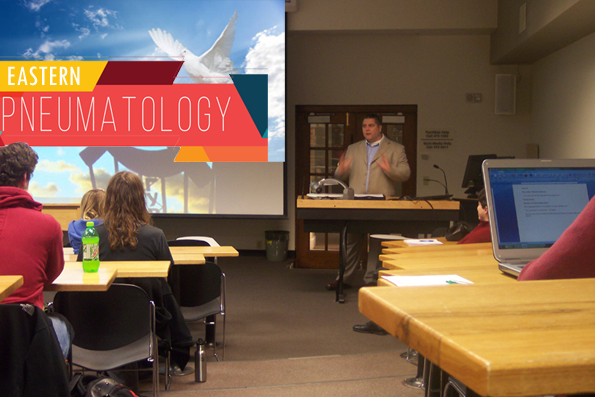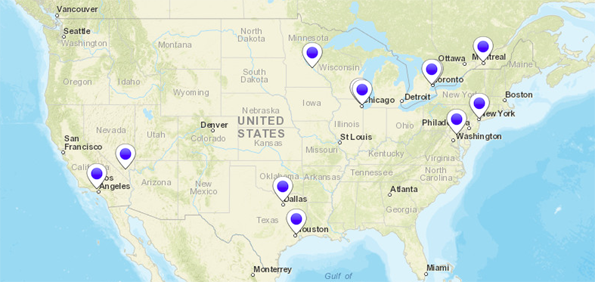The Non-Chalcedonian Eastern Church: West Syrian (Jacobite)

Dony K. Donev, D.Min.: Eastern Pneumotology Lectures
Eastern Orthodoxy can be expressed in one word: theism. The purpose and meaning of life is to become more like God. Deification is pursued by all means of human existence. This quest for divine likeness often includes the typical for the Eastern Church, speculation on the divinity and humanity of Christ, traditions on the doctrine of the Trinity and non-traditional mystical experiences. They appear in the context of both physical and spiritual characteristics in individual and corporate ecclesiastical environment. The role of the Spirit in the process of deification is threefold and involves: creation, re-creation and theism. Eastern Pneumotology follows the graduate process of theism development. The Spirit is involved in the original creation of the world as well as the new-birth experience. His work however, does not end there, but continues throughout the process of personal deification of the believer.
The Non-Chalcedonian Eastern Church: West Syrian (Jacobite)
The Jacobites viewed the presence of the Holy Spirit in three prime settings. Firstly, He is the agent of the original ex-nahilo creation and the spiritual re-creation in the second birth. Secondly, He is present in the baptism and chrismation. Lastly, He is the Transfigurator of the Eucharistic elements representing the body and the blood of Christ.5 [1]
Our prime source of information on the corporate ecclesiastical Coptic tradition is a document entitled The Odes of Solomon. Interesting to notice in this context of this writings is the fact that the Spirit is referred in a feminine gender.[2] However, this conception declined as the devotion to the person of Mary grew.[3]
Such a devotion is extraordinary noticeable in the life and writings of Ephrem the Syrian (ca. 306-373). He further compares the coming of the Holy Spirit upon Mary as the Spirit’s descent over both the water baptism and the elements of the Eucharist.[4] This is why in the Syriac baptismal service; the holy oil is powered onto the water.[5] For the same reason, Ephrem states that the Eucharist means involvement with the hosts of heaven.
Ephrem recognizes Spirit-activity through the entire panorama of salvation. The Spirit is present in the transformation of the fallen human creature into “the pristine of paradisiacal state.”[6] The gift of the Spirit is received in the water baptism where the believer receives a divine armor.[7]
A follower of Ephrem is Philoxenus of Mabbug (ca. 440-523). Among other issues, in his writings, he states that the life in the spirit is nothing else but a process of sanctification. He refers to it also as the spiritualization of the body, which is expressed through the domination of the body by the soul. The above results are possible only after fasting and prayer.[8] A contemporary of Philoxenus by the name of Severus of Antioch (ca. 465-ca. 539) adds to the above process the presence of the gifts of the Holy Spirit in the church as a sign of God’s divine election. In this sense, the Jacobites are carriers of the already-not-yet idea.[9]
[1] J. H. Barnard, The Odes of Solomon, Texts and Studies 8:3 (Cambridge: Cambridge University Press, 1912), 120-21.
[2] Ibid., 67, note on verse 17.
[3] Robert Murray, “Mary, the Second Eve in the Early Syriac Fathers,” Eastern Church Review 3:4 (Autumn 1971): 373.
[4] Ephrem, Nisibene Hymns 37.4 in CSCO 241, Syr. 103:13, and NPF 2nd Series 13:295.
[5] Ephrem, Hymns of Paradise 11, in CSCO 175, Syr. 79:43-46.
[6] Jean Danielou, From Shadows to Reality (Westminster: The Newman Press, 1960), 23-30.
[7] Ephrem, Hymns of the Epiphany 3.1-3, in CSCO 187, Syr. 83:18-19.
[8] E. A. Wallis Budge, The Discourses of Philoxenus, Bishop of Mabbogh, AD 485-519 (London: Asher and Co., 1894), “Eleventh Discourse on Assistance,” Budge 264.
[9] Burgess, 178.
Bulgarian Evangelical Churches on the West Coast (2021 Report)
Bulgarian Evangelical Churches – West Coast (2017 Report)
- Los Angeles (occasional/outreach of the Foursquare Church – Mission Hills, CA)
- Las Vegas (outreach of the Foursquare Church – http://lasvegaschurch.tv)
- San Francisco (occasional/inactive since 2012, Berkeley University/Concord, CA)
- Phoenix, AX (occasional/outreach)
READ MORE:
- First Bulgarian Church in Chicago Opened in 1907
- Gateway Cities for Bulgarian Evangelical Churches
- How to Start a Bulgarian Church in America from A-to-Z
- Unrealized Spiritual Harvest as a Paradigm for Cross-Cultural Ministries among Migrant and Disfranchised Ethnic Groups in America Today
Bulgarian Evangelical Churches on the West Coast (2017 Report)
Bulgarian Evangelical Churches – West Coast (2017 Report)
- Los Angeles (occasional/outreach of the Foursquare Church – Mission Hills, CA)
- Las Vegas (outreach of the Foursquare Church – http://lasvegaschurch.tv)
- San Francisco (occasional/inactive since 2012, Berkeley University/Concord, CA)
- Phoenix, AX (occasional/outreach)
READ MORE:
- First Bulgarian Church in Chicago Opened in 1907
- Gateway Cities for Bulgarian Evangelical Churches
- How to Start a Bulgarian Church in America from A-to-Z
- Unrealized Spiritual Harvest as a Paradigm for Cross-Cultural Ministries among Migrant and Disfranchised Ethnic Groups in America Today
Ministering at the Regional Church of God Exactly Nine Months before the Massive Youth Revival in the Schools of Delbarton, West Virginia
Click on the text-link to watch our message while ministering at the Regional Church of God exactly 9 months before the Massive Youth Revival in the Schools of Delbarton, West Virginia | http://www.ustream.tv/recorded/69822047
School Youth Revival Takes Over Delbarton, West Virginia
Exactly 9 months after ministering at the Regional Church of God in Delbarton, WV
When East Met West
 Fear not: for I am with thee: I will bring thy seed from the east, and gather thee from the west. (Isaiah 43:5, KJV)
Fear not: for I am with thee: I will bring thy seed from the east, and gather thee from the west. (Isaiah 43:5, KJV)
And I say unto you, that many shall come from the east and west, and shall sit down with Abraham, and Isaac, and Jacob, in the kingdom of heaven. (Matthew 8:11, KJV)
God promised to gather His people from the East and the West in the last days. With the world’s present fragmentation, this prophecy can be fulfilled only through divine intervention. The miraculous initiation of God’s plan began with the fall of the Berlin Wall in 1989.
With the collapse of the Berlin Wall, the Old Continent was introduced to a new set of opportunities and obstacles as the vision of a unified Europe quickly materialized. The clashing of two sociopolitical extremes, kept apart for half a century created a host of pressing dilemmas. In the midst of economical, political, social, cultural and simply human diversities, religion played a central role throughout the process that culminated in the emergence of the European Union. The religious reformative processes within Europe were not foreign to Bulgaria, a small post-Communist country located in the corner of Europe, the place where the East and the West, Europe and the Orient, Christianity and Islam have met for centuries.
After the exodus from Communism, the Bulgarian church quickly found itself unprepared for the role of religious frontier. The Orthodox majority, historically striving for symphony between church and state, remained insecure and drained from its symbiotic half-century existence with the Communist Regime. This condition quickly resulted in ongoing series of internal struggles and splits.
At the same time, the Protestant movement retained strength in some of its most powerful communities through the existence of underground churches. As freedom presented opportunity, Protestantism quickly spread. Pentecostal wings, represented by main stream denominations like the Church of God, the Assemblies of God and some newly found independent charismatic formations were primarily responsible for the rapid growth. While Orthodoxy remained a significant majority fide nomine tenus and the Catholic Church retained membership of 70,000, the Pentecostal revival which swept Bulgaria from 1989 to 1995 claimed over 100,000 new believers.
Unfortunately, the first steps toward freedom were sporadic and unplanned. The rapid growth could not compensate the lack of training and leadership, which the Protestant communities experienced under Communism. Global fast-paced change swept Eastern Europe, catching the Bulgarian church unprepared. The Protestant movement was unable to become a direct beneficiary of the freedom which it had long prophesied and fervently expected. The incapacity of the Protestant movement contributed to a preposterous preponderance of apathy in every area of church life:
1. Leadership: During the Communist Regime, the Protestant churches were constantly bombarded with direct denial of their independent existence as free religious communities. Insufficient leadership training created numerous deficiencies including inadequate knowledge of church governing procedures, low levels of personal and corporate accountability and ignorance of the church’s political and social roles. After the fall of the Wall, these crises in leadership quickly produced congregational splits and added to the confusion generated by the socio-economical struggles in the young Bulgarian democracy.
2. Religious freedom: State control and direct interference in church business continued even after 1989 through a government agency called Directorate of Religious Affairs. The agency could not provide the intended balance between church and state due to its default state ties. Its bureaucratic management style and lack of experts on all of the represented religious groups facilitated the legislation of regulations and actions which have led to continuous tensions between the various religious groups. Many Bulgarian and international observers have noted that the present situation may have been orchestrated by the state to control the religious life in Bulgaria by creating a complete dependence on the Directorate of Religious Affairs.
3. Communication: During the regime, the underground church discouraged official administration and communication due to fear of persecution. In the era of freedom, this practice continued, limiting contact between church leadership and local congregation. Lack of communication resulted in the failure to relate reverence of protestant tradition to the younger generation.
4. Postmodernism: Due to a focus on political and economical issues, the church in Bulgaria and the Bulgarian culture never realized the speed with which the emerging postmodernism entered 21st Century Bulgaria. The introduced secularism maintained the atheistic trend used as social foundation by the Communist Regime. Within the church, postmodern supporters quickly produced complete denial of historical and theological progress, demoralization and discontinuity with Biblical holiness.
5. Theology: The unification of Europe opened doors for travel and immigration, which initiated a theological exchange for which the Bulgarian church was unprepared. Subconsciously and inescapably, foreign theology flooded the Bulgarian church without the test of time and experience.
Perhaps the above list may not seem that much different than the multitude of issues currently faced by Protestantism around the globe. However, the situation associated with the meeting of the East and West in Bulgaria is defined by a distinguishing feature – the mentality of the people. It is there that the political, economical and, not lastly, theological transformations must take place. Without such transformations, even liberated, the Bulgarian church remains underground in reality.
The meeting of East and West facilitated the unification campaign occurring in Europe. The push towards a unified Europe shaped the formation of religious freedom in Bulgaria as Bulgarian politicians quickly implemented a new law of religions to replace the 1945 Confessions Act composed and used by the Communist Regime. The new legal definition was an unsuccessful attempt to impose a governmental solution to the crises experienced by the Orthodox Church and other religious communities in Bulgaria. The results were disastrous. On July 21, 2004, in a preplanned action upon the Chief Prosecutor’s order, the police stormed through 250 churches, detaining clergies in controversial raid to restore proprietorship of the official Bulgarian Orthodox Church.
What has become obvious thus far is the fact that state, law or government are unable and should not attempt to dictate the existence or actions of the church which as a divinely established institution holds a predominate place above them. Neither constitution, nor human law, but the Bible alone must be the source for transformation and reconstruction of the Bulgarian Church. The Bulgarian Christians must reclaim their past as a persecuted church which knows from experience how to go through persecutions and survive. At the same time, the persecuted church must continue to ask the question, how is it possible for a church to preserve its Biblical identity without going through persecutions? It is from this quest for Biblical identity in postcommunist and postmodern context, that a theology of freedom will emerge to respond to the needs and demands of the Christian community in Eastern Europe.









